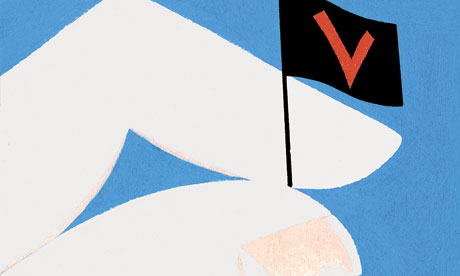
For obvious reasons, it's entirely appropriate that a book entitled The Underachiever's Manifesto never really became a huge seller. Written by an American doctor named Ray Bennett – not the kind of doctor whom I'd necessarily want if I had a life-threatening illness – it vanished soon after its debut, in 2006. Now, though, its publishers have finally got it together to release it as an ebook in Britain, so you can download it. I mean, if you like. Don't push yourself. After all, you're already doing great. As Bennett himself points out, "Being alive is by far your greatest achievement."
Subtitled The Guide To Accomplishing Little And Feeling Great, Bennett's short treatise seems at first like another of those jokey-but-unfunny gift books they sold by the tills at Borders, back before Borders itself stopped achieving. But it soon becomes clear there's more to it. "The achievement lobby is powerful," he notes early on, "and underachievement is, surprisingly, not as easy as it should be. Our world is so full of unrelenting messages about being the best you can be that it may not even have occurred to you to try for anything less." Yet "how many careers are coupled with disastrous marriages? How many talented, hard-working people smoke too much [and] exercise too little… How many fitness-crazed [people] tear up their knees running marathons?" Underachievement, the way Bennett uses the term, begins to seem less like an appealing option for the lazy-minded and more like a path to a superior kind of achievement.
Partly, that's just because moderation's often best. (Bennett's "underachiever's diet" involves avoiding bad fats and keeping treats occasional; his "underachiever's workout" entails walking, doing something with your upper body and getting enough sleep.) But the deeper point is your life is an enormously complex web of interacting variables, and it's impossible to know how, when you focus on maximising one or two of them, you'll end up distorting the others. "When we try to pick out anything by itself, we find it hitched to everything else in the universe," wrote the naturalist John Muir – an observation that's become a mantra for environmentalists, but which applies to individual lives, too. Tug too hard on one thread and the whole thing unravels.
This column has previously extolled the virtues of "deliberate mediocrity" as a strategy for beating perfectionism. But Bennett's stance evokes the idea, most often associated with Taoism, that knowing not to reach too far might be the essence of freedom. Forget the "stretch goals" beloved of business gurus. "Fill your bowl to the brim and it will spill," notes the Taoist sage Lao Tzu, in Stephen Mitchell's modern-day interpretation of the Tao Te Ching. "Keep sharpening your knife and it will blunt." Recognise where the limits lie, by contrast, and you'll have room for manoeuvre. "In knowing how far you'll be able to reach," explains Bill Mason, a writer on Taoism, "you'll have perfect freedom to choose just how far within that range to reach." Bennett quotes Picasso: "You must always work not just within, but below your means. If you can handle three elements, handle only two… In that way, the ones you do handle, you handle with more ease, more mastery, and you create a feeling of strength in reserve." I don't know about you, but I think I could settle for underachieving like Picasso.
• oliver.burkeman@theguardian.com; twitter.com/oliverburkeman

